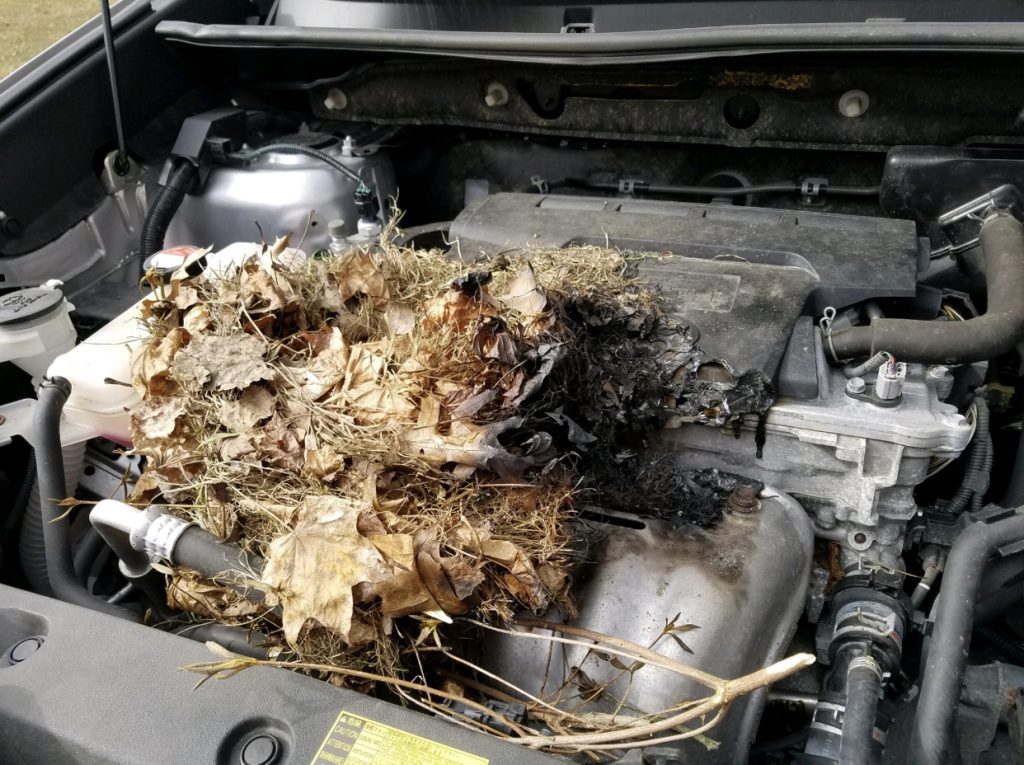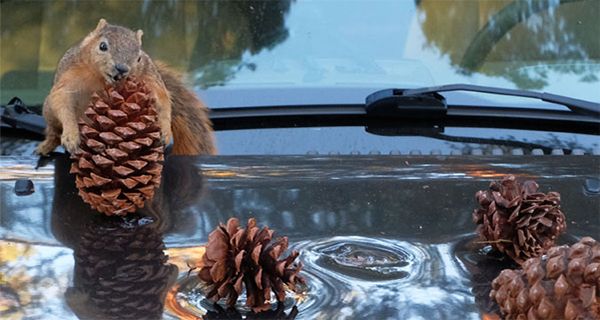Squirrels Gone Wild: The Shocking Truth About Car Wire Damage!
Squirrels are cute and furry creatures that can bring joy to many people. However, they can also be a nuisance when it comes to their habit of chewing on car wires. This behavior has become an increasing problem in recent years, causing frustration and financial burden for car owners. It is important to address this issue as it can lead to costly repairs and potential safety hazards.
Why Do Squirrels Chew Car Wires? Understanding the Behaviour
To understand why squirrels chew car wires, it is important to understand their behavior. Squirrels have a natural instinct to chew on objects, as it helps keep their teeth sharp and healthy. They also have a need to mark their territory, and chewing on objects can serve as a way for them to do so.
There are several reasons why squirrels specifically target car wires. One reason is that the wires are made of materials that squirrels find appealing, such as rubber and plastic. These materials have a texture that squirrels enjoy chewing on. Additionally, the wires may emit a small amount of electrical current, which can be enticing for squirrels.
The Cost of Squirrel Damage: How Much Does It Cost to Repair?

The cost of repairing squirrel damage to car wires can vary depending on the extent of the damage and the make and model of the car. On average, repairs can range from $200 to $1000 or more. This includes the cost of replacing damaged wires, as well as any additional repairs that may be necessary.
Several factors can affect the cost of repairs. The location of the damage plays a role, as wires that are located in hard-to-reach areas may require more labor and time to repair. The make and model of the car can also impact the cost, as some cars have more complex wiring systems than others. Additionally, if the damage extends beyond the wires and affects other components of the car, the cost of repairs can increase significantly.
Signs of Squirrel Damage: How to Identify the Problem
There are several signs that can indicate squirrel damage to car wires. One common sign is chewed or frayed wires. Squirrels have sharp teeth that can easily damage the insulation around the wires, exposing the metal underneath. This can lead to electrical issues and potential safety hazards.
Another sign of squirrel damage is a car that won’t start or has electrical issues. If you are experiencing problems with your car’s electrical system, it is possible that squirrels have chewed through the wires. Other signs include strange smells or noises coming from the car, as well as warning lights on the dashboard.
To inspect your car for squirrel damage, you can start by visually inspecting the engine compartment. Look for any signs of chewed wires or exposed metal. You can also use a flashlight to get a better view of hard-to-reach areas. If you suspect squirrel damage but are unsure, it is best to consult with a professional mechanic.
Prevention is Key: Tips to Protect Your Car from Squirrel Damage
Preventing squirrel damage to your car is key to avoiding costly repairs and potential safety hazards. Here are some tips to protect your car from squirrel damage:
- Park in a garage or enclosed area: If possible, park your car in a garage or enclosed area where squirrels cannot access it. This will greatly reduce the risk of squirrel damage.
- Use deterrents: There are several deterrents available that can help keep squirrels away from your car. These include motion-activated sprinklers, ultrasonic devices, and natural repellents such as peppermint oil or mothballs.
- Trim trees and shrubs: Squirrels often use trees and shrubs as a pathway to access cars. By trimming branches and shrubs near your parking area, you can make it more difficult for squirrels to reach your car.
- Cover exposed wires: If you have exposed wires in your engine compartment, consider covering them with wire loom or a protective sleeve. This can make the wires less appealing to squirrels and protect them from damage.
- Clean up food sources: Squirrels are attracted to food sources, so it is important to keep your parking area clean and free of any food debris. This includes bird feeders, fallen fruits, and garbage bins.
DIY Solutions: How to Deter Squirrels from Chewing Your Car Wires
If you prefer a do-it-yourself approach, there are several DIY solutions that can help deter squirrels from chewing your car wires. Here are a few ideas:
- Cayenne pepper spray: Mix cayenne pepper with water and spray it on the wires and surrounding areas. The strong smell and taste of the pepper can deter squirrels from chewing.
- Aluminum foil: Wrap aluminum foil around the wires in your engine compartment. The shiny surface and crinkling sound can scare away squirrels.
- Predator urine: Purchase predator urine from a hunting supply store and spray it around your parking area. The scent of predator urine can make squirrels think there is a threat nearby and deter them from approaching.
- Chicken wire: Place chicken wire around the base of trees near your parking area to prevent squirrels from climbing up and accessing your car.
Professional Help: When to Call an Exterminator or Auto Mechanic
If you have tried DIY solutions but are still experiencing squirrel damage to your car, it may be time to seek professional help. Here are some situations where you should consider calling an exterminator or auto mechanic:
- Severe damage: If the damage to your car is extensive or if you are unsure how to repair it yourself, it is best to consult with a professional auto mechanic. They have the knowledge and expertise to properly repair the damage and ensure the safety of your car.
- Ongoing infestation: If you are dealing with an ongoing squirrel infestation and DIY solutions are not effective, it may be necessary to call an exterminator. They can assess the situation and implement measures to remove the squirrels from your property.
- Safety concerns: If you suspect that the squirrel damage has compromised the safety of your car, such as affecting the electrical system or causing a potential fire hazard, it is important to seek professional help immediately.
Legal Implications: Who is Responsible for Squirrel Damage to Your Car?

When it comes to squirrel damage to your car, determining who is responsible can be a complex issue. In most cases, car insurance policies do not cover damage caused by rodents or other animals. This means that car owners are typically responsible for the cost of repairs.
However, if the damage occurs on someone else’s property, such as a parking lot or garage, there may be legal implications. Property owners have a duty to maintain their premises in a safe condition, which includes taking measures to prevent squirrel damage. If they fail to do so and their negligence leads to squirrel damage to your car, they may be held liable for the cost of repairs.
It is important to consult with a legal professional if you believe that someone else’s negligence has led to squirrel damage to your car. They can assess the situation and provide guidance on how to proceed.
Environmental Impact: How Squirrel Damage Affects the Ecosystem
While squirrel damage to cars can be frustrating and costly for car owners, it is also important to consider the environmental impact of this issue. Squirrels play an important role in ecosystems as seed dispersers and tree planters. Their chewing behavior is a natural instinct that helps them survive in the wild.
However, as urban areas expand and encroach on squirrel habitats, squirrels are forced to adapt and find new food sources. This can lead to an increase in squirrel damage to cars as they search for materials to chew on. Finding a balance between protecting your car and preserving the environment is crucial.
Conclusion: The Importance of Addressing Squirrel Damage to Your Car
In conclusion, squirrel damage to car wires is an increasing problem that can lead to costly repairs and potential safety hazards. Understanding squirrel behavior and taking preventative measures can help protect your car from damage. DIY solutions can be effective, but if the damage is severe or ongoing, it may be necessary to seek professional help. It is also important to consider the legal implications and environmental impact of squirrel damage. By taking action to prevent squirrel damage, you can protect your car and contribute to a healthier ecosystem.
